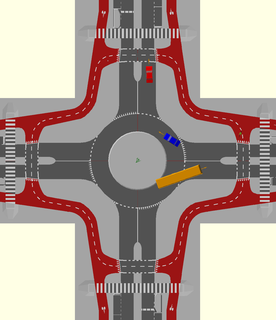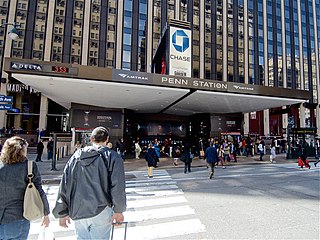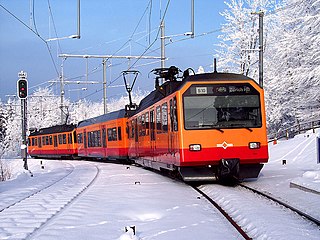
The telecommunication infrastructure of Singapore spans the entire city-state. Its development level is high, with close accessibility to the infrastructure from nearly all inhabited parts of the island and for all of the population, with exceptions. Today, the country is considered an international telecommunications hub, an achievement that was driven by Singapore's view that high-quality telecommunications is one of the critical factors that support its economic growth.
Regional planning deals with the efficient placement of land-use activities, infrastructure, and settlement growth across a larger area of land than an individual city or town. Regional planning is related to urban planning as it relates land use practices on a broader scale. It also includes formulating laws that will guide the efficient planning and management of such said regions. Regional planning can be comprehensive by covering various subjects, but it more often specifies a particular subject, which requires region-wide consideration.

Infrastructure is the fundamental facilities and systems serving a country, city, or other area, including the services and facilities necessary for its economy to function. Infrastructure is composed of public and private physical improvements such as roads, railways, bridges, tunnels, water supply, sewers, electrical grids, and telecommunications. In general, it has also been defined as "the physical components of interrelated systems providing commodities and services essential to enable, sustain, or enhance societal living conditions".

An industrial park is an area zoned and planned for the purpose of industrial development. An industrial park can be thought of as a more "heavyweight" version of a business park or office park, which has offices and light industry, rather than heavy industry.

Tea Tree Plaza Interchange is a bus interchange operated by Adelaide Metro in Modbury, South Australia as part of the O-Bahn Busway. It is a central public transport hub for the north eastern suburbs of Adelaide.

Bicycle transportation planning and engineering are the disciplines related to transportation engineering and transportation planning concerning bicycles as a mode of transport and the concomitant study, design and implementation of cycling infrastructure. It includes the study and design of dedicated transport facilities for cyclists as well as mixed-mode environments and how both of these examples can be made to work safely. In jurisdictions such as the United States it is often practiced in conjunction with planning for pedestrians as a part of active transportation planning.

Infopark, Kochi is an information technology park situated in the city of Kochi, Kerala, India. Established in 2004 by the Government of Kerala, the park is spread over 260 acres (105.2 ha) of campus across two phases, housing 392 companies which employ more than 42,000 professionals as of 2018. Infopark Phase 1 is spread over a 101 acres (40.9 ha) campus with more than 6,000,000 sq ft (557,400 m2) of operational built-up space and is expanding further. Infopark Phase II is spread over 160 acres (64.7 ha) of campus which would have a total built-up space of 8,000,000 sq ft (743,200 m2) upon completion and would employ close to 80,000 professionals. The notable tenants in the park include native giants like Tata Consultancy Services, Cognizant, Wipro, HCL, UST Global, IBS Software Services etc. and foreign corporations like KPMG, Ernst & Young, EXL Service, Etisalat, Hubbell, Northgate, Nielsen Audio, Xerox, Conduent etc.

A transport hub is a place where passengers and cargo are exchanged between vehicles or/and between transport modes. Public transport hubs include train stations, rapid transit stations, bus stops, tram stop, airports and ferry slips. Freight hubs include classification yards, airports, seaports and truck terminals, or combinations of these. For private transport, the parking lot functions as a hub.

The Multi-modal International Cargo Hub and Airport at Nagpur (MIHAN) is an airport project for Dr. Babasaheb Ambedkar International Airport, Nagpur. It is the biggest economical development project currently underway in India in terms of investments. The project aims to exploit the central location of Nagpur and convert the present airport into a major cargo hub with integrated road and rail connectivity.

Land transport is the transport or movement of people, animals or goods from one location to another location on land. The two main forms of land transport are rail transport and road transport.
The Delhi–Mumbai Industrial Corridor Project (DMIC) is a planned industrial development project between India's capital, Delhi and its financial hub, Mumbai. The DMIC project was launched in pursuance of an MOU signed between the Government of India and the Government of Japan in December 2006. It is one of the world's largest infrastructure projects with an estimated investment of US$90 billion and is planned as a high-tech industrial zone spread across six states, as well as Delhi, the national capital and itself a Union Territory. The investments will be spread across the 1,500 km long Western Dedicated Freight Corridor which will serve as the industrial corridor's transportation backbone.

Transport or transportation is the movement of humans, animals and goods from one location to another. In other words, the action of transport is defined as a particular movement of an organism or thing from a point A to a point B. Modes of transport include air, land, water, cable, pipeline and space. The field can be divided into infrastructure, vehicles and operations. Transport enables trade between people, which is essential for the development of civilizations.
The National Highway System in Canada is a federal designation for a strategic transport network of highways and freeways. The system includes but is not limited to the Trans-Canada Highway, and currently consists of 38,021 kilometres (23,625 mi) of roadway designated under one of three classes: Core Routes, Feeder Routes, and Northern and Remote Routes.
Infrastructure of Iraq describes the infrastructure of the country of Iraq. Throughout the history of Iraq, the country's infrastructure, along with its politics and economy, have been affected by armed conflicts; none more serious than the 2003 Invasion and subsequent reconstruction.

A clock-face schedule or cyclic schedule is a timetable system under which public transport services run at consistent intervals, as opposed to a timetable that is purely driven by demand and has irregular headways. The name derives from the fact that departures take place at the same time or times during the day. For example, services with a half-hourly frequency might leave at 5:15, 5:45, 6:15, 6:45, 7:15, 7:45 etc.

Sohar International Airport is an international airport situated in the wilayat of Sohar in Al Batinah Region of Oman. Sohar is a coastal city on the Gulf of Oman.
Pembina Pipeline is a Canadian corporation that operates transportation and storage infrastructure delivering oil and natural gas to and from parts of Western Canada ; there is also a natural gas processing business that takes place at the Cutbank Complex. Western Canada is the source of all the product transported by its systems. Some of the pipelines and facilities have short term contracts with oil producers while others are long term. For 37 years until 1997 when it went public and established itself as a trust, Pembina was a regular privately owned business. On October 1, 2010 it converted to a corporation from a trust, changing its official name from Pembina Pipeline Income Fund to Pembina Pipeline Corporation. As of 2016 the company had more than 1260 employees up from 427 in 2010. The company's total assets nearly doubled in 2017.

Egis Group is a French engineering group involved in the areas of infrastructure and transport systems, planning, water and environment. Egis is also involved in the business of setting up projects and operations for roads and airports.

Marat Shakirzyanovich Khusnullin is a Russian politician serving as Deputy Prime Minister of Russia for Construction and Regional Development since 2020. He previously served as Deputy Mayor of Moscow from 2010 to 2020.

A radial route is a public transport route linking a central point in a city or town, usually in the central business district (CBD), with a suburb of that city or town. Such a route can be operated by various forms of public transport, including commuter rail, rapid transit, trams (streetcars), trolleybuses, or motor buses.














